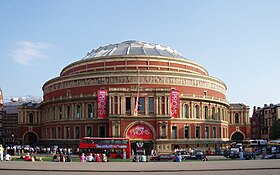

The BBC Proms is an eight-week summer season of daily orchestral classical music concerts and other events held annually, predominantly in the Royal Albert Hall in central London. Robert Newman founded The Proms in 1895. Since 1927, the BBC has organised and broadcast The Proms. Each season consists of concerts in the Royal Albert Hall, chamber music concerts at Cadogan Hall (or occasionally other venues), additional Proms in the Park events across the UK on the Last Night of the Proms, and associated educational and children's events. Recently, concerts have been held in additional cities across different nations of the UK, as part of Proms Around the UK. [1][2] The season is a significant event in British culture and in classical music. Czech conductor Jiří Bělohlávek described the Proms as "the world's largest and most democratic musical festival".[3]
Prom is short for promenade concert, a term which originally referred to outdoor concerts in London's pleasure gardens, where the audience was free to stroll around while the orchestra was playing. In the context of the BBC Proms, promming refers to the use of the standing areas inside the hall (the Arena and Gallery) for which ticket prices are much lower than for the seating. Proms concert-goers, particularly those who stand, are sometimes referred to as "Prommers" or "Promenaders".
- ^ - Proms Around the UK Events, BBC, 2024. BBC, 15 September 2024.
- ^ - The BBC Proms 2024: Everything you need to know about the world’s greatest classical music festival, BBC Media Centre, 26 April 2024. BBC, 15 September 2024.
- ^ 2007 Last Night of the Proms speech, Jiří Bělohlávek, 8 September 2007. Daily Kos, 3 November 2007.